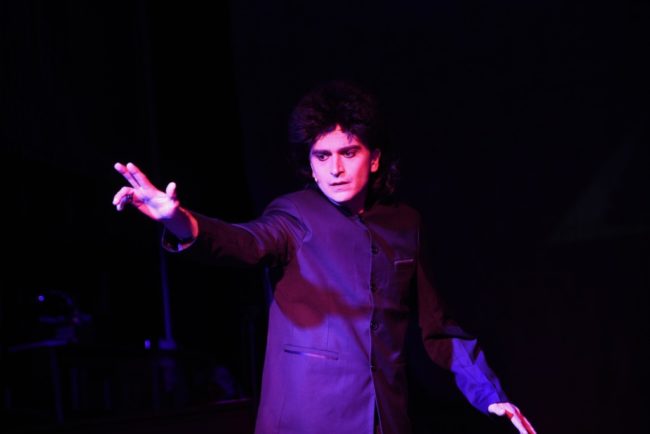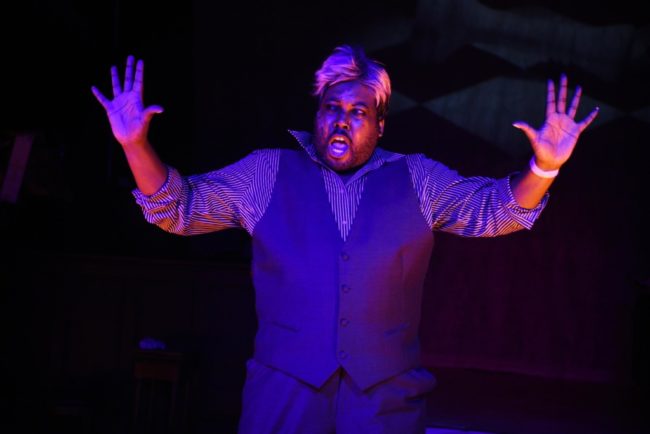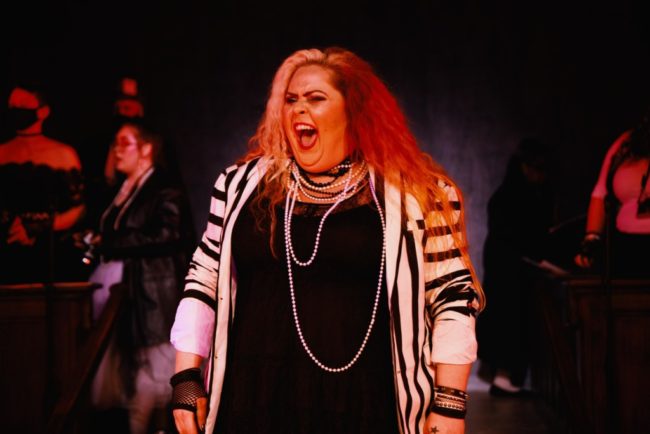Everybody’s playing the game— but nobody’s rules are the same— nobody’s on nobody’s side! It may be a direct quote from one of the show’s songs, but how hauntingly true it stands to this semi-post-pandemic world we’re all trying to scrape by in as it stands. Theatre is returning, for many— despite being May of 2022— these ‘late spring’ productions are the first live-in-person performances that companies are getting to experience since closing their doors over two years ago. And that’s the case for Third Wall Productions— who much like some of the characters in their beloved Chess— have survived an indescribable darkness. Displaced, homeless, wondering if they’d ever get to perform again they’re settling into their new home at Trinity Episcopal Church (of Towson) and birthing the musical they had hoped to present in the spring of 2020— Chess (The UK version.) Directed by Lance Bankerd with Musical Direction—a combined effort of William Zellhofer as Orchestra Conductor and Primary Vocal Coach with Christine Thomas-O’Meally as Choirmaster— and Choreography by Kristi Schaffner, this conceptually complicated musical has a great deal of praises to be sung (and you will hear the people sing) as TWP settles into their new home.

Director Lance Bankerd has essentially modeled the production around the concept of a “concert musical” where there aren’t massive set pieces and the staging is deceptively simplistic. This works in the sanctuary space of Trinity Episcopal Church as the company adapts to its new performance home. Bankerd utilizes “The Choir” (instead of the ensemble) as a visual bridge to connect the performance itself to the space where the company hangs its home-wearing hat. (If you’re going to play in a church, embrace it, and Bankerd does.) The Choir parades in like actual choir members, holding their ‘hymnal’ books (containing the music and lyrics for the musical) and stands to deliver and sing a great many of their parts looking like a church choir. A few things go awry in the overall execution of this concept— primarily some of the younger choir members forgetting to remember to pick-up/use their hymnal books and forgetting that they’re on stage in an active live production and need to sit still— but ultimately the effect Bankerd is going for is achieved. When they provide the backing vocal support to some of the numbers, like “Nobody’s Side” its rather a striking effect.
Costumes for this concert-esque production become a unique interpretation on what the notion of Chess means to the individuals in the production. While the principal players— Freddy, Florence, and Anatoly— have striking costumes that fit both the black and white monochromatic theme of the chessboard, and Florence’s outfits basically steal the show every time she walks on stage, the choir costumes (as devised by the choir members with coordinator by Amy Rudai) are a bit of a mixed-bag jumble. The assignment appeared to be “find what Chess in the 80’s looks like for you” and the result was a cacophony of black and white outfit pieces, various checkered accessories, and some questionable ‘80’s-inspired makeup’; some of the choir members made their characters look as if they’d freshly arrived from Alice’s rabbit hole, while others were more subtle; overall, again the concept of what Bankerd was going for was there, it just slightly missed the mark during execution. The Arbiter (at this performance Maggie Flannigan) was a masterful representation of this costume concept, accurately representing both black and white sides of the board evenly— as is the role of The Arbiter— with checkered leggings, gloves, and more.
While the scenic design for the show (compliments of Pat Rudai) is deceptively simple— the raked chessboard floor that leads up to the main altar/choir seats— it is effective in creating the illusion that you’re being sucked into the world of Chess— both game and musical. Projection Designer Chris Uehlinger has created stunning and evocative projections, predominantly featuring pieces from the chess board, that align flawlessly in a gripping and stirring fashion with various musical numbers throughout the performance. Without giving away too much of Uehlinger’s mystique, when the spraying fountain of carousel style chess pieces go rotating about during “Where I Want To Be” you feel the shockwaves and emotional implications of such a visual aid to the performer in that moment with such gusto— it’s jaw-dropping.
For as brilliant and as striking as th projections are in this production, the overall lighting design has some extremely questionable elements that are, at times, off-putting and distracting from the performance as a whole. Technical Coordinator Zachary Stuart has a lot of fancy lighting equipment in play for the shows’ illuminations, but much of it is superfluous. Moving lights, even slower ones, aren’t necessary for ever musical number; at least twice they majorly distract from stellar moments of musical solos (weird moving lights during “Heaven Help My Heart” distort Florence as she sings her heart out and again with the heinous green-drift during “Mountain Duet” which makes Florence and Anatoly look as if they’re making a hybrid production of The Great Gatsby meets The Zombie Prom.)

But lighting and costume confusion aside (and we won’t nit-pick the microphone issues; a new space and new mic system takes time to learn all the nuances of), the production is vocally astonishing and brilliant. The live orchestra, conducted by William Zellhofer, along with the Choir (at this performance— Rachel Bagley, Penni Barnett, Aislinn Coughlin, Tara Herbert, Cece Heck, Robert Howard, Dissonance McManus, Sela McMullen, Daniel Plante, Nick Ruth, Nancy Williams-Nettles) blend and balance naturally to create sweeping waves of aural bliss all throughout the performance. The standout performer (credited as the Mayor of Merano) among this ensemble is Robert Howard. His lusty voice and rich rounded vocals fill out moments of numbers like “Merano” joyously. And watch him dance fleetly and gaily in this number; it’s a treat!
Choreographer Kristi Schaffner puts her skill set on display during the various actual “Chess Matches.” While there is a projection featuring the chess board and the movements of the pieces in the background, Schaffner’s work is interpretive and evocative as she utilizes two dancers— one clad in black and one clad in white (and variations thereof, selecting from ‘The Dancers: Andrea Applebee, Rachel Huber, Melissa Lloyd, Anastasia McKenzie, and Schaffner herself)— to perform a hypnotic sort of ballet-inspired dance routine. Freddy Trumper and Anatoly Sergievsky, as the masterminds behind the game, manipulate their hands like wizards or magicians, guiding and manipulating the pawns and pieces in their game while a pair of dancers move about one another, occasionally moving to ‘take one down’ as a piece is eliminated from play. This is a visually striking piece to watch and draws the attention of the audience with intrigue.
The Sveltlana character, played to perfection by Lizzy Jackson Fleischmann, is a stellar knockout that the audience gets to experience for just a few moments during the second act. Her voice is phenomenal and you feel all of the emotional turmoil she stirs to life during “I Know Him So Well.” Fleischmann fills the entire vaulted-ceilinged space with this extraordinary sound when she first belts out “Someone Else’s Story” and the tragically beautiful realization that she should be a queen but is merely a pawn in the game— controlled on all sides by someone else, whether it’s Walter De Courcey (Nick Rose) of the CIA, Alexander Molokov (Michael Zellhofer) of the KGB or the great manipulator, love itself— is so profoundly moving, you struggle not to cry. There’s even the subtle hint of a Russian accent that she uses only when speaking with Anatoly, as if to imply that when the characters are alone together they would speak in their native tongue one on one.

Transforming the role of Anatoly Sergievsky, Henry Cyr explores the deeply human side of the character, giving him depth and reality and personality beyond just the larger-than-life expectation of the ‘Russian Player.’ (The script even flips itself by the second act so that the character becomes more than the opponent; a shift which Cyr handles masterfully.) When Cyr rockets into “Where I Want To Be” it starts as this eerie and haunting almost lullaby-like number, which quickly shifts gears and blasts out into this frenetic, churning maelstrom of inner conflict, all of which comes pouring out of his vocals in a raw and uncontrolled spew of volatile conflictions and confrontational emotions. Cyr masterfully traverses the changing tempo and style of this number’s score with striking duality; it’s very ‘Jekyll & Hyde’. The “Mountain Duet” that he performs with the Florence character is subtle, almost sweet, showcasing yet another face of Cyr’s vocal prowess. But the defining moment for Cyr’s Anatoly is at the end of Act I, when he delivers an emotionally eviscerating rendition of “Anthem”, roaring the audience to thunderous applause to close out the first half of the production.

Sergievsky faces off with ‘The American’— Frederick Trumper (J Purnell Hargrove) both on the board and off. Hargrove is bringing the Freddy Trumper character to roaring, riveting life in indescribable ways. The tantrums are more epic, the sense of petulant entitlement rolling off the character in waves and yet Hargrove finds a way to temper all of that flaming hot ego against a harrowing and brutally vulnerable side of the character that is so rarely explored let alone exposed. Hargrove gives a mercurial and versatile performance as “The American” with scream-rocker vocals appropriate for the part. There are a great many segments delivered in recitative which Hargrove articulates perfectly, never missing a beat. They are on point for all of these biting, snapping exchanges; watch their facial expressions and body language (and if they remember, their light-up sneakers!) The thing that is perhaps the most sensational about Hargrove’s portrayal of Freddy is the way they choose to interpret and delivery “Pity The Child.” There is something deeply personal but also personable about Hargrove’s approach to this song; they bring an honest, human connection of personal experience to the lyrics and at moments even stop-short to speak-sing a word instead of carrying it on the note. But those are moments are meticulously selected for maximum emotional impact and the overall effect is striking beyond compare.

Chess may be a ‘man’s game’ (there’s even some scripted backlash about how The American’s second is a woman) but this show is dominated by the queen- Florence (Siobhan Beckett.) The roller coaster of emotions and song styles that Beckett delivers in this performance is award-winning quality, full stop. The sheer spirit and emotional energy surging up from her every time she sings quakes through the ears and souls of the audience without apology. As Florence Vassy, Beckett isn’t playing by the rules, she’s making her own up as she goes, scorching perfect belt after belt into each of her numbers. There’s even a milder song, which doesn’t involve belting her face off— “Heaven Help My Heart” but the sound and emotional turmoil delivered in this number is so raw and forceful you’re feeling it in your core. With dresses and costumes that really showcase her style, while still incorporating Bankerd’s overall vision of “everyone be what Chess means to you”, Beckett is one of the most impressive visual features in the performance (next to the astonishing productions.) Dominating the back-and-forth recitative delivery of “Florence & Molokov” with spice and ferocity there is never just one note of emotional existence in Beckett’s Florence. Delivering an intricately nuanced sea of rage, confusion, and deep feelings, “Nobody’s Side” becomes her own personal anthem in the first act of the show.
There are stunning vocals and impressive visuals in this production; there’s some kinks they’re still figuring out. But as Chess is rarely done and the performance is the first live, in-person show to prove that Third Wall Productions made it through, it’s worth supporting this spring season.
Running Time: 3 hours with one intermission
Chess plays May 13th through May 22nd 2022 with Third Wall Productions at their new home in Trinity Episcopal Church— 120 Alleghany Avenue in Towson, MD. For tickets call the box office at 443-838-4064 or purchase them online.
To read the interview with three principal performers from Chess, click here.

